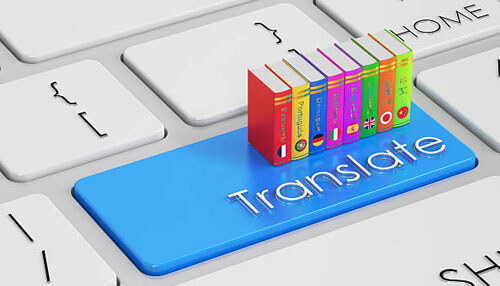Discover the Growing Demand for Translation Services
The world is becoming increasingly interconnected, and the need for translation services is growing exponentially. As businesses, organizations, and individuals seek to expand their reach and communicate with diverse audiences, the demand for skilled translators is on the rise. This trend creates a lucrative opportunity for individuals to get paid to translate text and turn their language skills into a profitable career.
Various industries, including business, education, and healthcare, require translation services to cater to their diverse customer base. For instance, companies looking to expand into new markets need to translate their website content, marketing materials, and product descriptions to reach their target audience. Similarly, educational institutions require translation services to provide study materials and resources to students who speak different languages. The healthcare industry also relies on translation services to communicate with patients who have limited proficiency in the dominant language of the region.
The growth of the translation industry is driven by the increasing need for global communication. As more businesses go online, the demand for translation services is expected to rise. According to a report by the Bureau of Labor Statistics, employment of interpreters and translators is projected to grow 29% from 2020 to 2030, much faster than the average for all occupations. This growth trend presents a promising opportunity for individuals to get paid to translate text and build a successful career in the translation industry.
The demand for translation services is not limited to traditional industries. The rise of e-commerce, online education, and digital media has created new opportunities for translators to work on a wide range of projects, from website localization to subtitling and dubbing. With the increasing demand for translation services, individuals can capitalize on their language skills and get paid to translate text in various formats and industries.
What Kind of Texts Can You Get Paid to Translate?
As a translator, you can get paid to translate a wide range of texts across various industries. One of the most in-demand types of texts is website content, including product descriptions, blog posts, and landing pages. Many companies need to translate their website content to reach a global audience and expand their customer base.
Documents, such as contracts, reports, and manuals, are also in high demand for translation. Businesses, governments, and organizations require accurate and precise translations of these documents to facilitate international communication and collaboration.
Audio and video files, including podcasts, videos, and subtitles, are another type of text that requires translation. With the rise of online media, the demand for audio and video translation is increasing rapidly. Translators can get paid to translate these files for clients in the entertainment, education, and marketing industries.
Software and app localization is another lucrative area for translators. As technology advances, the demand for software and app translation is growing, and translators can get paid to translate software and app content, including user interfaces, help files, and documentation.
Examples of companies and organizations that require translation services include multinational corporations, government agencies, educational institutions, and non-profit organizations. For instance, companies like Google, Amazon, and Microsoft require translation services to expand their global reach, while government agencies like the United Nations and the European Union require translation services to facilitate international communication.
Additionally, industries like healthcare, finance, and law also require translation services to communicate with clients and customers who speak different languages. Translators can get paid to translate medical records, financial documents, and legal contracts, among other types of texts.
Overall, the types of texts that require translation are diverse and numerous, offering many opportunities for translators to get paid to translate text and build a successful career in the translation industry.
How to Get Started as a Paid Translator
Getting started as a paid translator requires a strategic approach to identifying your language strengths, acquiring necessary skills and certifications, and creating a professional portfolio. The first step is to assess your language skills and identify your areas of expertise. Consider your native language, language proficiency, and any specialized knowledge or training you may have.
Next, acquire the necessary skills and certifications to become a competitive translator. Consider enrolling in a translation course or certification program, such as the Certified Translator (CT) or the Certified Interpretation (CI) programs. These programs can help you develop your translation skills, learn industry-standard software, and gain a competitive edge in the job market.
Create a professional portfolio that showcases your translation skills and experience. Include samples of your work, such as translations of articles, documents, or websites. Also, include any relevant certifications, training, or education you have received. A strong portfolio can help you stand out to potential clients and demonstrate your expertise as a translator.
Develop a professional online presence, including a website or profile on freelance platforms like Upwork or Freelancer. This will help you promote your services, showcase your portfolio, and connect with potential clients. Make sure to highlight your language skills, certifications, and experience in your online profile.
Network with other translators and industry professionals to learn about job opportunities, best practices, and industry trends. Attend conferences, join online forums or groups, and connect with other translators on social media. Building relationships with other translators can help you stay informed about the industry and find new job opportunities.
Finally, consider specializing in a particular industry or niche, such as medical translation, technical translation, or financial translation. Specializing can help you stand out to potential clients and increase your earning potential. With the right skills, certifications, and experience, you can get paid to translate text and build a successful career as a translator.
Top Platforms and Marketplaces for Finding Translation Work
As a translator, finding consistent and well-paying work can be a challenge. However, with the rise of online platforms and marketplaces, it’s easier than ever to connect with clients and find translation work. In this section, we’ll review some of the top platforms and marketplaces for finding translation work, including Upwork, Freelancer, and TranslatorsCafé.
Upwork is one of the largest freelance marketplaces in the world, with a vast pool of clients looking for translation services. Translators can create a profile, showcase their portfolio, and bid on projects that match their skills and expertise. Upwork offers a range of tools and features to help translators manage their workflow, including time tracking, invoicing, and messaging.
Freelancer is another popular platform for finding translation work. With over 25 million registered users, Freelancer offers a vast pool of potential clients and projects. Translators can compete for projects by bidding on jobs, and the platform offers a range of features to help manage workflow and communication.
TranslatorsCafé is a specialized platform for translators, offering a range of tools and resources to help manage workflow and find new projects. The platform allows translators to create a profile, showcase their portfolio, and connect with clients looking for translation services. TranslatorsCafé also offers a range of features to help manage workflow, including project management tools and invoicing.
Other platforms and marketplaces for finding translation work include ProZ, TranslationDirectory, and Gengo. Each platform has its own unique features and benefits, and translators can choose the ones that best fit their needs and goals.
When using these platforms, it’s essential to create a strong profile, showcase your portfolio, and bid on projects that match your skills and expertise. By following these tips, you can increase your chances of finding consistent and well-paying translation work and get paid to translate text.
In addition to these platforms, translators can also find work through personal networking, referrals, and marketing their services directly to clients. By building a strong online presence and networking with other translators and industry professionals, you can increase your visibility and attract new clients.
How to Set Your Rates and Negotiate with Clients
As a translator, setting your rates and negotiating with clients can be a challenging task. However, with the right approach, you can ensure that you are fairly compensated for your work and build a successful career as a paid translator. In this section, we’ll provide tips on how to determine fair rates for translation services and offer advice on how to negotiate with clients and manage expectations.
When determining your rates, consider the following factors: language pair, text complexity, and turnaround time. Different language pairs may require different rates, and complex texts may require higher rates due to the level of expertise and time required. Turnaround time is also an important factor, as rush jobs may require higher rates due to the urgency of the project.
Another important factor to consider is the level of expertise required for the project. Specialized translations, such as technical or medical translations, may require higher rates due to the level of expertise and knowledge required. Additionally, the level of research required for the project may also impact the rate.
When negotiating with clients, it’s essential to be clear and transparent about your rates and the services you offer. Provide a detailed quote that includes the scope of work, timeline, and rate, and be prepared to negotiate and answer any questions the client may have.
Managing client expectations is also crucial to building a successful career as a paid translator. Be clear about the services you offer, the timeline, and the rate, and ensure that the client understands the scope of work and the level of expertise required. Regular communication and updates can also help to manage client expectations and ensure a smooth project workflow.
By following these tips, you can ensure that you are fairly compensated for your work and build a successful career as a paid translator. Remember to stay flexible and adapt to the needs of your clients, and always be willing to negotiate and find a mutually beneficial agreement.
In addition to these tips, it’s also essential to have a clear understanding of the market rates for translation services. Research the market and understand the average rates for different language pairs, text complexity, and turnaround times. This will help you to determine fair rates for your services and ensure that you are competitive in the market.
Tools and Software to Boost Your Translation Productivity
As a translator, having the right tools and software can significantly boost your productivity and accuracy. In this section, we’ll introduce some of the most popular tools and software used in the translation industry, including CAT tools, translation memory, and terminology management software.
CAT (Computer-Assisted Translation) tools are software programs that help translators to work more efficiently and accurately. These tools can analyze the source text, suggest translations, and even automate repetitive tasks. Some popular CAT tools include MemoQ, SDL Trados, and Wordfast.
Translation memory is a database that stores previously translated texts and their corresponding translations. This allows translators to reuse previously translated content, reducing the time and effort required to complete a project. Translation memory can be used in conjunction with CAT tools to further boost productivity.
Terminology management software is used to manage and maintain a consistent terminology across different projects and clients. This software can help translators to ensure that they are using the correct terminology and avoid errors.
Other tools and software used in the translation industry include project management software, such as Asana and Trello, and time tracking software, such as Harvest and Toggl. These tools can help translators to manage their workload, track their time, and stay organized.
When choosing a tool or software, it’s essential to consider your specific needs and goals. Think about the type of projects you work on, the languages you translate, and the level of complexity involved. Research different options, read reviews, and try out demos before making a decision.
By using the right tools and software, you can significantly boost your productivity and accuracy as a translator. This can help you to complete projects more efficiently, deliver high-quality work, and get paid to translate text.
In addition to these tools and software, it’s also essential to stay up-to-date with the latest trends and developments in the translation industry. Attend conferences, workshops, and webinars to learn about new tools and technologies, and network with other translators to share knowledge and best practices.
Building a Successful Career as a Paid Translator
Building a successful career as a paid translator requires a combination of skills, knowledge, and experience. In this section, we’ll share strategies for building a successful career as a paid translator, including continuous learning, networking, and marketing oneself.
Continuous learning is essential for translators to stay up-to-date with the latest developments in the industry. This includes attending conferences, workshops, and webinars, as well as reading industry publications and blogs. By staying informed, translators can improve their skills and knowledge, and stay competitive in the market.
Networking is also crucial for translators to build relationships with other professionals in the industry. This includes joining professional associations, attending industry events, and connecting with other translators on social media. By building a network of contacts, translators can find new opportunities, get feedback on their work, and stay informed about industry developments.
Marketing oneself is also important for translators to promote their services and attract new clients. This includes creating a professional website, developing a portfolio, and using social media to promote one’s services. By marketing oneself effectively, translators can increase their visibility, attract new clients, and build a successful career.
Specialization is also key to building a successful career as a paid translator. By specializing in a particular industry or niche, translators can develop a deeper understanding of the terminology and concepts used in that industry, and provide higher-quality translations. This can also help translators to differentiate themselves from other translators and attract higher-paying clients.
Developing a niche expertise is also important for translators to stand out in the market. This includes developing a deep understanding of a particular industry or niche, and staying up-to-date with the latest developments in that industry. By developing a niche expertise, translators can attract higher-paying clients and build a successful career.
By following these strategies, translators can build a successful career as a paid translator and get paid to translate text. Remember to stay focused, persistent, and always be willing to learn and improve.
In addition to these strategies, it’s also essential to have a strong work ethic and be able to manage one’s time effectively. This includes setting clear goals, prioritizing tasks, and avoiding distractions. By having a strong work ethic and managing one’s time effectively, translators can complete projects efficiently, deliver high-quality work, and build a successful career.
Overcoming Common Challenges and Staying Motivated
As a translator, you may face various challenges that can affect your motivation and productivity. In this section, we’ll address common challenges faced by translators and offer advice on how to overcome them and stay motivated in the long term.
Managing workload is one of the most common challenges faced by translators. With multiple projects and deadlines to meet, it can be overwhelming to manage your workload effectively. To overcome this challenge, prioritize your tasks, set clear goals, and use project management tools to stay organized.
Dealing with difficult clients is another challenge that translators may face. To overcome this challenge, communicate clearly and effectively with your clients, set clear expectations, and be proactive in resolving any issues that may arise.
Maintaining motivation is also crucial for translators to stay productive and deliver high-quality work. To stay motivated, set clear goals, reward yourself for achieving milestones, and take breaks to avoid burnout.
In addition to these challenges, translators may also face issues with payment, communication, and cultural differences. To overcome these challenges, be clear about your payment terms, communicate effectively with your clients, and be sensitive to cultural differences.
By overcoming these common challenges and staying motivated, translators can build a successful career and get paid to translate text. Remember to stay focused, persistent, and always be willing to learn and improve.
Staying motivated is also important for translators to maintain their physical and mental well-being. By taking care of your physical and mental health, you can stay motivated and focused, and deliver high-quality work.
In conclusion, overcoming common challenges and staying motivated is crucial for translators to build a successful career and get paid to translate text. By following the tips and advice outlined in this article, translators can overcome common challenges and stay motivated in the long term.








